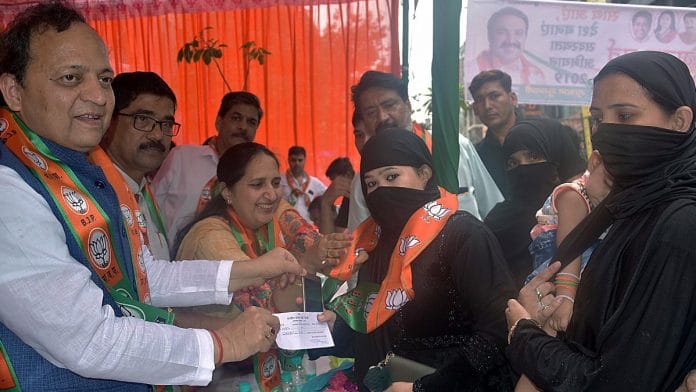Sixty Muslim candidates representing the Bharatiya Janata Party secured victory in the municipal elections held in Uttar Pradesh earlier this month. This development could mark a significant milestone in the country’s political landscape, showcasing the growing inclusivity within the BJP and reflecting a shift in perceptions regarding the representation of minority communities.
The emergence of Muslim candidates successfully contesting on BJP tickets challenges the long-held narrative that the BJP predominantly represents the interests of the majority Hindu population. Traditionally associated with conservative and nationalist ideologies, the BJP has recently shown a commitment to expanding its support base and embracing diversity within its ranks.
The party has been giving place to individuals who share its nationalist ideology, regardless of their religious identity. And the recent decision to field more Muslim candidates further demonstrates a willingness to expand its support base and promote diversity within its ranks.
During the recent West Bengal state elections too, the BJP provided opportunities to Muslim candidates. The party fielded nine Muslim candidates who unfortunately were not successful in securing seats.
Also Read: Muslims in India aren’t under ‘attack’. Making Atiq Ahmed icon of victimhood betrays reality
Pasmanda outreach gaining ground in UP
The BJP has fielded Muslim candidates not just in local body polls but also in assembly and Lok Sabha elections, but they have not been successful in securing seats, with the exception of Aminul Haque Laskar who stands as the lone Muslim candidate elected to a legislative assembly on a BJP ticket.
The party has achieved notable success in the 2015 Gujarat local body polls when 110 Muslim candidates reportedly won on a BJP ticket. In 2021, they fielded 31 Muslims.
The party seems to be effectively using the same strategy in the local body elections in Uttar Pradesh. 60 BJP-backed Muslim candidates won, including five who became chairpersons of Nagar panchayats. A total of 395 Muslim candidates were fielded with state party leaders adding that nearly 90 per cent of them belonged to the Pasmanda Muslim community.
These results are significant as they have sparked a debate on whether Muslims are now willing to vote for the BJP, given that Muslim candidates previously fielded by the party did not receive substantial support from voters.
Inclusivity or tokenism
The achievements of these Muslim candidates carry a message of inclusivity, empowerment, and equal opportunity. The BJP’s decision is a substantial stride towards promoting a more diverse political landscape.
But it is not enough that the party takes such a step, it is equally crucial for voters to positively respond to such inclusive measures. This is why the response from Pasmanda Muslims to this initiative is particularly noteworthy, as it reflects that they are prioritising their own welfare over political rhetoric. This development not only benefits the Muslim candidates themselves but also reinforces the democratic framework of the nation, enabling a broader range of voices to be heard and represented.
There is an ongoing debate regarding the BJP’s initiative, with some experts suggesting it may be tokenism. They say that if the party was keen on the upliftment of Muslims they would have fielded candidates from the community in Assembly elections or for mayoral positions. However, they have acknowledged that the Muslim community has not been met with “step-motherly” treatment in terms of welfare schemes.
The experts added that BJP’s primary agenda is to appeal to the Pasmanda Muslim community and create a favourable image to garner support from liberal sections.
While one may view the BJP’s initiative with scepticism, it is important to recognise that the party has indeed backed Muslim candidates in West Bengal and appointed a Muslim minister, Danish Azad Ansari, to the Uttar Pradesh Cabinet.
Also Read: What lies at the heart of Ram Navami violence? Indian labels like ‘Muslim areas’
Political evolution and strategy
As a political party, the BJP makes decisions that are beneficial to its own interests and electoral success, this is an undeniable truth. The party’s recent successes will likely boost its confidence in providing opportunities to individuals who align with its ideology and can secure votes.
The BJP’s decision to field Muslim candidates can be seen as a strategic move to gain greater electoral traction. By breaking away from its traditional voter base and diversifying its candidate pool, the party aims to attract support from a wider cross-section of society. This approach not only promotes diversity within the party but also helps to bridge the gap between different religious communities, fostering a more inclusive and pluralistic political landscape.
While the victories of these Muslim candidates on BJP tickets are commendable, they also come with challenges.
Some members within the Muslim community may express scepticism or doubt the sincerity of these developments, citing past controversies or divisive rhetoric. It is essential for the BJP to continue its efforts towards fostering an environment of trust and inclusivity, ensuring that these victories are not mere tokenism but genuine steps toward representation and participation.
BJP’s moves should also act as an example for other political parties. They must build upon these positive steps and foster an environment where all citizens, regardless of their religious or ethnic background, have equal opportunities to participate and contribute to the nation’s progress.
Amana Begam Ansari is a columnist, writer, TV News Panelist. She also runs a weekly Youtube show called ‘India this Week by Amana and Khalid’. Views are personal.






